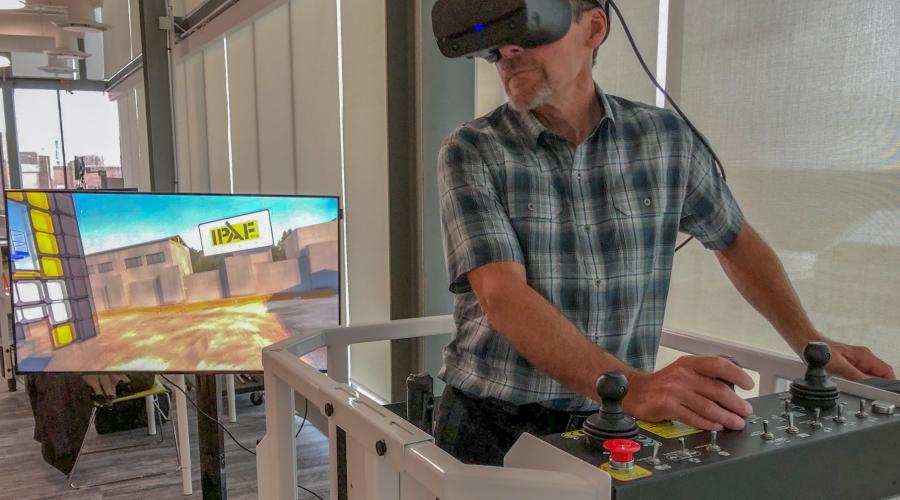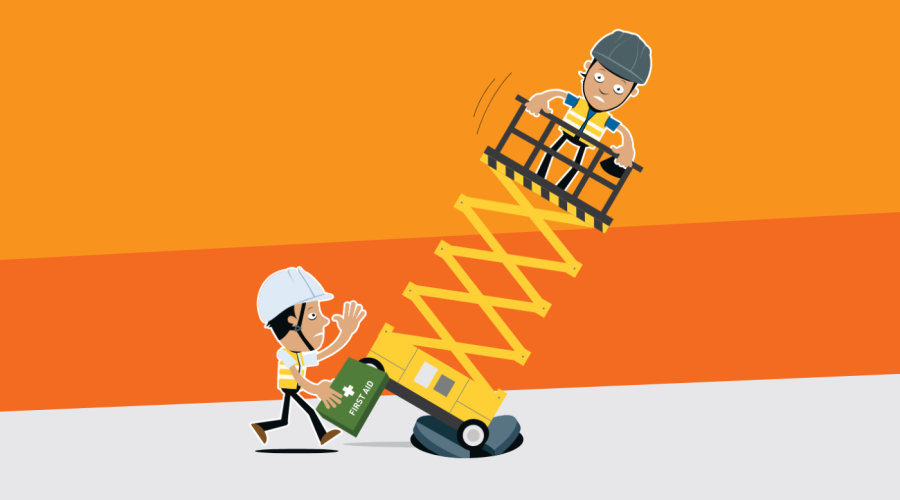Use of simulators in IPAF PAL+ Test gets green light

The use of virtual reality (VR) simulators as part of the assessment process of advanced operator training courses has been approved by the International Powered Access Federation (IPAF) Council.
Approved training centres delivering IPAF’s PAL+ advanced Mobile Elevating Work Platform (MEWP) operator course now have the option of assessing candidates in a VR environment as an alternative to the standard assessment using real MEWPs and a specially constructed superstructure to operate around.
IPAF PAL+ is only open to existing valid Powered Access Licence (PAL) Card-holders and demonstrates a higher level of proficiency and dexterity in carrying out complex manoeuvres, as often required of contractors in advanced construction, manufacturing, engineering or processing applications.
Paul Roddis, IPAF’s Training Manager, says: “Our trials showed that VR simulators are well suited for testing control, observation and decision-making required for conducting various advanced-level operations and working intensively with the precision required in applications such as manufacturing, complex construction projects and the like.
“There’s been a huge amount of hard work put into making these assessment scenarios as lifelike in the VR environment as possible; the next step was to prove the technology using real training candidates under genuine assessment conditions.
“This required support and input from our Training Centre members to find out how best the VR technology can help them deliver IPAF courses most efficiently, and we are grateful to some of our leading Training Centres in the UK and North America for engaging with these live trials using real candidates.
“Thanks to the dedication and hard work of IPAF member firm Serious Labs, who have developed this sophisticated VR simulator and software platform, and with invaluable input from IPAF training providers, staff and members of the IPAF Training Committee, we are now fully satisfied that the simulated test was a fair and exact representation of an assessment using real machines under the watchful eye of a human instructor.
“Our instructors can be confident that candidates using simulators will have a good deal of prior time using real machines, and the VR assessment has been rigorously tested to ensure it transposes precisely the experience of operating a real MEWP.”
Jim Colvin, CEO of Serious Labs, comments: “It’s exciting to see this long-term project come to fruition. To see virtual reality technology be put through such careful and thorough testing by IPAF and its members and have such encouraging results gives us great confidence about the future of training in a simulated environment.”
Peter Douglas, IPAF CEO & MD, adds: “Following extensive development work and fine-tuning involving IPAF staff and member firms in Europe and North America, IPAF has now completed controlled trials involving some of its training members delivering PAL+ training, testing candidates using MEWP simulators instead of real machines.
“The results have been considered and validated by the IPAF Council, which has now resolved that those Training Centres wishing to use VR simulators instead of real MEWPs to assess IPAF PAL+ trainees may do so, with all other elements of the course such as demonstrating how to inspect machines and operating scissor lifts from outside the platform using remote controls also now translated into the simulator.
“Candidates passing the IPAF PAL+ training using a VR simulator will be awarded their certificate and upgraded PAL Card as normal, and the certification will not differ in any way to those who have been trained and assessed using real machines.
“IPAF Training Centres can of course choose to continue delivering PAL+ training using real MEWPs, but we hope this change to allow VR simulators as part of the assessment by an instructor will appeal to some training centres, particularly those who may not previously have had facilities to allow them to offer the IPAF PAL+ course.
“It will also allow on-site training in conjunction with accredited IPAF training providers, which will prove useful for contractors delivering complex infrastructure and construction projects like data centres or the HS2 rail link from Birmingham to London in the UK.
“This will give our global network of approved training centres added flexibility to deliver the widest possible range of IPAF courses, as well as allowing candidates to rehearse and perform complicated manoeuvres and at-risk scenarios without ever leaving the ground, and meaning training and assessment can go ahead in all weather conditions.”
“IPAF is keen to collaborate with any company developing VR simulators to see how IPAF’s training may be adapted to work on their platform and how the technology can be used to enhance MEWP safety awareness training and familiarisation worldwide.”
